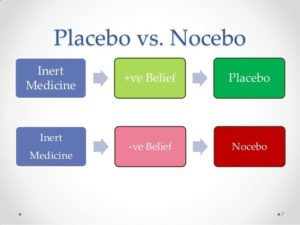We all know about the ‘nocebo’ effect by now – the dark twin of the beneficial placebo effect. For example, a study showed that the pharmacological efficacy of remifentanil (a pain medication) was significantly decreased after patients were told the infusion was stopped during a heat-pain modulation test. Although the infusion had not actually been halted, participants experienced a significant exacerbation of pain even while still receiving remifentanil.
To counter undesirable ‘nocebo’ effects, this article suggests to health practitioners that ‘pragmatic strategies related to patient–practitioner interaction, clinical setting, and context may be implemented to help minimize and prevent the consolidation of negative expectations’.


